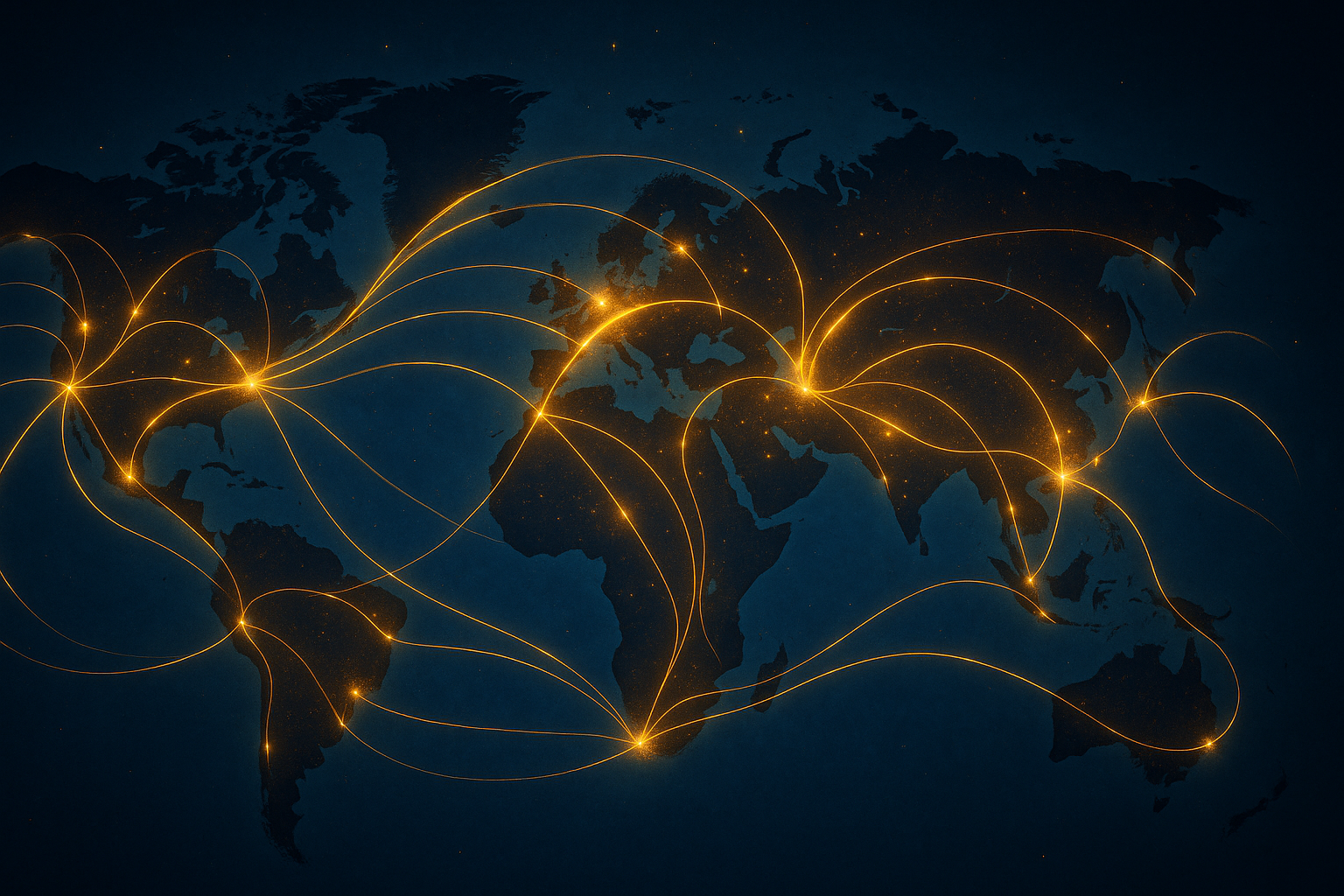Pipelines of Possibility
Why humanity’s problem isn’t money or power, but the systems that move them.
The Myth of Scarcity
Everywhere we look, scarcity seems to dominate the conversation. We hear about wealth gaps, collapsing economies, and the rising cost of living as though the planet itself has run out of resources. Yet the truth is far more hopeful: there is enough money on Earth for every person to be stable, healthy, and comfortable.
The issue isn’t a shortage of currency. It isn’t even a shortage of power. The real challenge is that the pipelines for currency to flow are incomplete—designed for a limited set of participants, shaped by outdated assumptions, and insulated by cultures that protect what exists instead of cultivating what could be.
Money is like water. If the pipes are narrow, broken, or controlled by a few valves, entire regions stay dry no matter how much water exists upstream. Expanding the supply alone doesn’t solve the problem. We need new pipelines—routes that carry value to every household, every neighbourhood, every life.
More Than Money
Pipelines are not only financial. They are cultural, social, and emotional. A new economic channel will fail if it moves through an atmosphere poisoned by mistrust or neglect. Culture either enables flow or blocks it.
Think of a neighbourhood with abundant funding for development but no shared sense of belonging. Buildings might rise, but opportunity will not circulate. Without trust, people hoard. Without a narrative of shared benefit, participants compete instead of contribute. Money pools in a few hands and stagnates.
To build functional pipelines, we must therefore design not only the technical channels of finance but the cultural climates that sustain them. Systems need both structure and spirit: bankable mechanisms for exchange, and a surrounding culture that rewards generosity, creativity, and collective uplift.
The GSM Approach
Global Stage Management™ (GSM) exists to meet this dual challenge. It is not merely a company or a platform; it is a producer of culture and frameworks that introduce new pipeline configurations.
GSM begins by identifying what has been missing from the global economy:
Access for those excluded by geography or background.
Pathways for talent that does not fit old credential systems.
Structures that honour contribution beyond profit alone.
Rather than adding new layers to already dominant sectors, GSM prioritises the under-served dimensions first. Health, education, creativity, and community trust become the foundation. Once these neglected aspects are stabilised, GSM merges them with the existing financial and commercial networks.
The result is not a parallel economy or a utopian experiment. It is a bankable, integrative system—a set of pipelines compatible with the current financial architecture yet designed to distribute opportunity far more widely.
Designing New Flow
Building such pipelines requires more than goodwill. It demands careful engineering at three levels:
Financial Architecture – Tools and agreements that allow new channels to be recognised by banks, investors, and governments.
Cultural Atmosphere – Narratives, events, and experiences that normalise collaboration, making generosity aspirational rather than risky.
Human Development – Education and personal growth frameworks that prepare individuals to participate meaningfully, not just receive benefits.
GSM treats these levels as interdependent. A brilliant funding model will collapse if people lack the confidence or knowledge to engage. Likewise, a vibrant culture of trust cannot scale without technical systems that move value efficiently and transparently.
Solving the “Impossible”
For centuries, economists and social thinkers have wrestled with a paradox: how to create universal stability without collapsing incentive. If everyone is secure, what drives progress? If progress depends on inequality, how do we avoid suffering?
GSM approaches this conundrum by reframing value itself. Progress is no longer measured solely by personal accumulation but by network expansion—the degree to which one’s success opens doors for others. In this model, the highest achievers are those who create the most inclusive pipelines. Incentive remains, but its rewards depend on contribution rather than extraction.
When neglected aspects of society are prioritised and merged with existing strengths, the entire system rises. Cultural production feeds economic flow; economic flow funds further cultural production. What once looked impossible begins to function with elegant inevitability.
Culture as Currency
Consider music, sport, storytelling, and community rituals. These are not side activities to an economy; they are engines of trust and meaning. They shape identity, attract participation, and generate the emotional energy that keeps value moving.
GSM invests in culture as infrastructure, designing festivals, media platforms, and creative networks that draw people into shared experiences. Each gathering, performance, or digital release becomes more than entertainment—it becomes a pressure valve, a meeting place, and a recruitment ground for new economic participants.
In this way, culture does what legislation alone cannot: it makes inclusion desirable. People are not simply given access; they are invited into a story where contribution is celebrated and rewarded.
Toward a Stable Future
Imagine a world where every person has reliable access to health, housing, education, and meaningful work. The obstacle is not a lack of wealth. It is the absence of bankable, principle-driven pipelines supported by cultures of trust.
GSM’s mission is to build those pipelines. By addressing missing pieces first, integrating them with existing financial systems, and surrounding them with life-giving culture, GSM turns a centuries-old puzzle into a practical design.
Money already exists. Power already exists. What we lack is flow—and flow is what GSM is here to create.
Key Takeaway
Humanity does not need more wealth; it needs better circulation of the wealth it already has. Stable, healthy, and comfortable lives become possible when financial and cultural pipelines are built to include every soul. GSM’s work is to design those pathways, merge them with the current system, and prove that the “impossible” is simply a matter of architecture.


